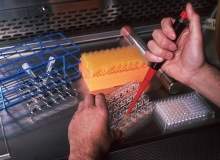

For decades drug treatments have been undertaken using the same formula. Work with the antibodies in the hope of finding a way to combat the growth and attack, attack, attack until (hopefully) the cancerous cells are kept at bay.

Discover B2B Marketing That Performs
Combine business intelligence and editorial excellence to reach engaged professionals across 36 leading media platforms.
This, however, was not the way John Simard, founder and CEO of XBiotech – the makers of an entirely new treatment – saw as a good use of the resources available.
"There is an urgent need for new forms of anti-tumour, disease-modifying cancer therapies that effectively control disease while being less toxic," said Simard. "We believe that our True Human monoclonal antibody targeting interleukin-1 alpha has the potential to meet this critical need."
In 2005 Simard founded XBiotech and began work on a new strategy, one that could combat those cancerous cells in a different way: by using antibodies derived without modification from individuals who possess natural immunity to certain diseases that could be fed intravenously into the body. The hope was to use the body’s natural human defences and immunity to fight disease with increased safety, efficacy and tolerability.
Looking for the key mediator

US Tariffs are shifting - will you react or anticipate?
Don’t let policy changes catch you off guard. Stay proactive with real-time data and expert analysis.
By GlobalDataWorking previously in other pharma industries, Simard set up a lab in Austin, Texas, and began using antibody samples from blood donations to set about creating a new cancer drug that used this idea.
The company looked for a feasible way of doing this. “We used healthy volunteers with natural immunity to viral antibodies and diseases,” Simard explains.
The drug was launched at a parallel event to the 18th European Society of Medical Oncology (ESMO) World Congress on Gastrointestinal Cancer in Barcelona, Spain where Simard and XBiotech’s chief medical consultant, Dr Tamas Hickish, explained the concept of the drug and their plans for the future.
"During the clinical trials they were astounded to see these marked results in several categories."
The goal of the drug therapy was to maintain or increase the weight and lean body mass of severely ill patients, which was hoped to stabilise their condition or increase their ability to fight the cancer advances. During the clinical trials they were astounded to see these marked results in several categories. Namely, a threefold survival rate increase in colorectal patients if there was this muscle recovery.
Xilonix, whilst also being highly effective in combating the disease, also had fewer side effects on those taking it. Nausea, loss of appetite, lethargy, weight loss and diarrhoea were all reduced compared to those in the control groups. When, after an eight week dose of placebos, the groups were swapped, quality of life results in patient surveys shot up by 76%.
On the fast-track
The drug has received fast track approval from the European Medicines Agency (EMA) and will be produced from a new purpose-built facility in Austin, Texas where unique machines that Simard designed himself – at a fraction of the cost and complexity of other drug developments – will set about the process of mixing the healthy antibodies. However, Xilonix is still awaiting US and rest of world approval, but Simard is hopeful that it is merely a matter of time and foresees no hold ups once the process gets underway.
Simard was positive about the drug’s fast track by the EMA, believing the reason for it was that the agency is well aware of the deficiencies of current treatments in the area, and is hopeful for new treatments and novel ideas.
If this drug is a success it could open up new ways of not only searching for cures in terms of antibodies, but could also help improve the lives of patients through a much less painful, less stressful way of undergoing treatment for gastric cancers.




